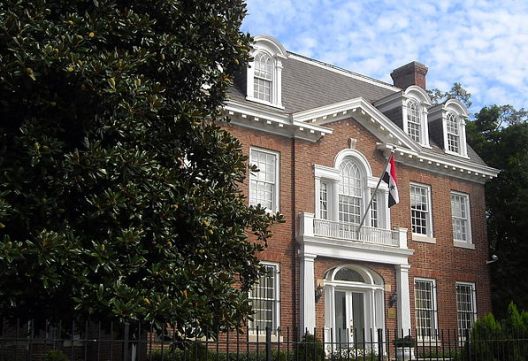 Special Envoy for Syria Daniel Rubinstein yesterday announced that the United States had notified the Syrian government “that it must immediately suspend operations of its Embassy in Washington, DC and its honorary consulates in Troy, Michigan and Houston, Texas.” Of potentially greater significance, however, is the decision of the Obama administration to maintain diplomatic relations with Syria and to continue to recognize the entity fronting for the Assad clan as the government of Syria. Unless the United States works with allies and friends to facilitate the creation of an alternate government on Syrian territory to be recognized, supported, and defended by the Friends of the Syrian People, the suspension of diplomatic operations will go down as the latest in a series of empty gestures.
Special Envoy for Syria Daniel Rubinstein yesterday announced that the United States had notified the Syrian government “that it must immediately suspend operations of its Embassy in Washington, DC and its honorary consulates in Troy, Michigan and Houston, Texas.” Of potentially greater significance, however, is the decision of the Obama administration to maintain diplomatic relations with Syria and to continue to recognize the entity fronting for the Assad clan as the government of Syria. Unless the United States works with allies and friends to facilitate the creation of an alternate government on Syrian territory to be recognized, supported, and defended by the Friends of the Syrian People, the suspension of diplomatic operations will go down as the latest in a series of empty gestures.
The announcement served two laudably overt purposes: it helped to introduce Special Envoy Rubinstein, an extraordinarily capable career diplomat; and it enabled the United States to be seen as doing something in connection with the third anniversary of the Assad regime’s war on Syria. Time will tell whether or not it also served another end: to perpetuate inaction with respect to facilitating an alternative to Assad’s rump government inside Syria.
The justification employed by the administration in the Rubinstein statement to maintain diplomatic relations cited, of all things, the Syrian people. “Despite the differences between our governments, the United States continues to maintain diplomatic relations with the state of Syria as an expression of our longstanding ties with the Syrian people, an interest that will endure long after Bashar al-Assad leaves power.” The phrase “between our governments” confirms that Washington continues to view Bashar al-Assad as Syria’s chief of state. As for “longstanding ties,” surely those words apply to the people of the United States and Cuba. Yet there have been no diplomatic relations between Washington and Havana for more than fifty years.
Indeed, the US Department of State spokesperson pointed out that there are three states with which the United States has no diplomatic relations: Cuba, Iran, and North Korea. Washington is not, according to the spokesperson, breaking diplomatic ties with Damascus because “We still have hope for our future relations with the people of Syria.” Although her intent surely was not to deny hope to Cubans, Iranians, and Koreans living north of the 38th parallel, the effect of the statement was to illustrate the emptiness of the justification.
Whether or not the suspending of Syrian embassy operations joins Washington’s December 2012 “legitimate representative of the Syrian people” recognition of the Syrian National Coalition as an empty, space-filling, gesture depends entirely on what’s next in terms of action. Will there be a meaningful effort to arm, train, and equip Syrian forces willing to fight both the regime and Islamist extremists, including al-Qaeda affiliates? Will there be a disciplined effort to help link nationalist military forces, local committees, and the Syrian National Coalition so that decent governance can be established in areas currently beyond the regime’s control? Will the United States and the balance of the London 11 continue, in the very recent words of the independent international commission of inquiry, merely to “bear witness to the plight of those caught in the maelstrom?”
One thing is certain: if the shuttering of an already moribund embassy operation is left to stand on its own, neither the regime, nor Iran, nor Russia will be much impressed. Allies and adversaries alike await with interest to see what’s next.
Frederic C. Hof is a resident senior fellow with the Atlantic Council’s Rafik Hariri Center for the Middle East.
Image: Embassy of Syria in Washington, DC. (Photo: Wikimedia)
